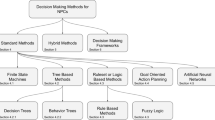Abstract
Believability is a basic requirement for non-player characters of videogames. Players enjoy characters with personalities that reflect human behavior, specially if those personalities combine well with players’ temperaments. This paper explains a model for customizing automatically non-player characters (NPC) according to the players temperament, which is obtained before the game session. The model uses Case-Based Reasoning and Ontologies to adapt the behavior of a NPC, which is the companion of a player character in the described example.
Supported by the Spanish Ministry of Education and Science (TIN2005-09382-C02-01, TIN2006-15140-C03-02 and TIN2006-14433-C02-01 projects), Complutense University of Madrid and the G.D. of Universities and Research of the Community of Madrid (UCM-CAM-910494 research group grant).
Preview
Unable to display preview. Download preview PDF.
Similar content being viewed by others
References
Armengol, E., Plaza, E.: A knowledge level model of knowledge based reasoning. In: Haton, J.-P., Manago, M., Keane, M.A. (eds.) EWCBR 1994. LNCS, vol. 984, pp. 53–64. Springer, Heidelberg (1995)
Brusilovsky, P.: Methods and techniques of adaptive hypermedia. User Modeling and User Adapted Interaction: Special issue on adaptive hypertext and hypermedia 6(2-3), 87–129 (1996)
Díaz-Agudo, B., González-Calero, P.A.: An architecture for knowledge intensive CBR systems. In: Blanzieri, E., Portinale, L. (eds.) EWCBR 2000. LNCS (LNAI), vol. 1898, Springer, Heidelberg (2000)
Díaz-Agudo, B., González-Calero, P.A.: Knowledge intensive cbr through ontologies. Expert Update (2003)
Gómez-Gauchía, H., Díaz-Agudo, B., González-Calero, P.A.: Cobber, toward an affective conversational ki-cbr framework. In: Prasad, B. (ed.) Procs of the 2nd Indian International Conference on Artificial Intelligence IICAI 2005, Pune, India, December, 20-22, 2005, pp. 1804–1820 (2005)
Keirsey, D.: Please Understand Me II. Prometheus Nemesis Book Co. Inc. (1998)
Mateas, M., Stern, A.: Façade: An experiment in building a fully-realized interactive drama. In: Game Developer’s Conference, Game Design track, San Jose, California, USA (2003)
Salotti, S., Ventos, V.: Study and formalization of a case-based reasoning system using a description logic. In: Smyth, B., Cunningham, P. (eds.) EWCBR 1998. LNCS (LNAI), vol. 1488, Springer, Heidelberg (1998)
Author information
Authors and Affiliations
Editor information
Editors and Affiliations
Rights and permissions
Copyright information
© 2006 Springer-Verlag Berlin Heidelberg
About this paper
Cite this paper
Gómez-Gauchía, H., Peinado, F. (2006). Automatic Customization of Non-Player Characters Using Players Temperament. In: Göbel, S., Malkewitz, R., Iurgel, I. (eds) Technologies for Interactive Digital Storytelling and Entertainment. TIDSE 2006. Lecture Notes in Computer Science, vol 4326. Springer, Berlin, Heidelberg. https://doi.org/10.1007/11944577_25
Download citation
DOI: https://doi.org/10.1007/11944577_25
Publisher Name: Springer, Berlin, Heidelberg
Print ISBN: 978-3-540-49934-3
Online ISBN: 978-3-540-49935-0
eBook Packages: Computer ScienceComputer Science (R0)




